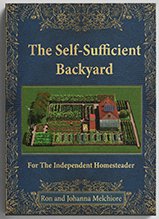How To Learn About Farming For The Wanna-Be Small Grower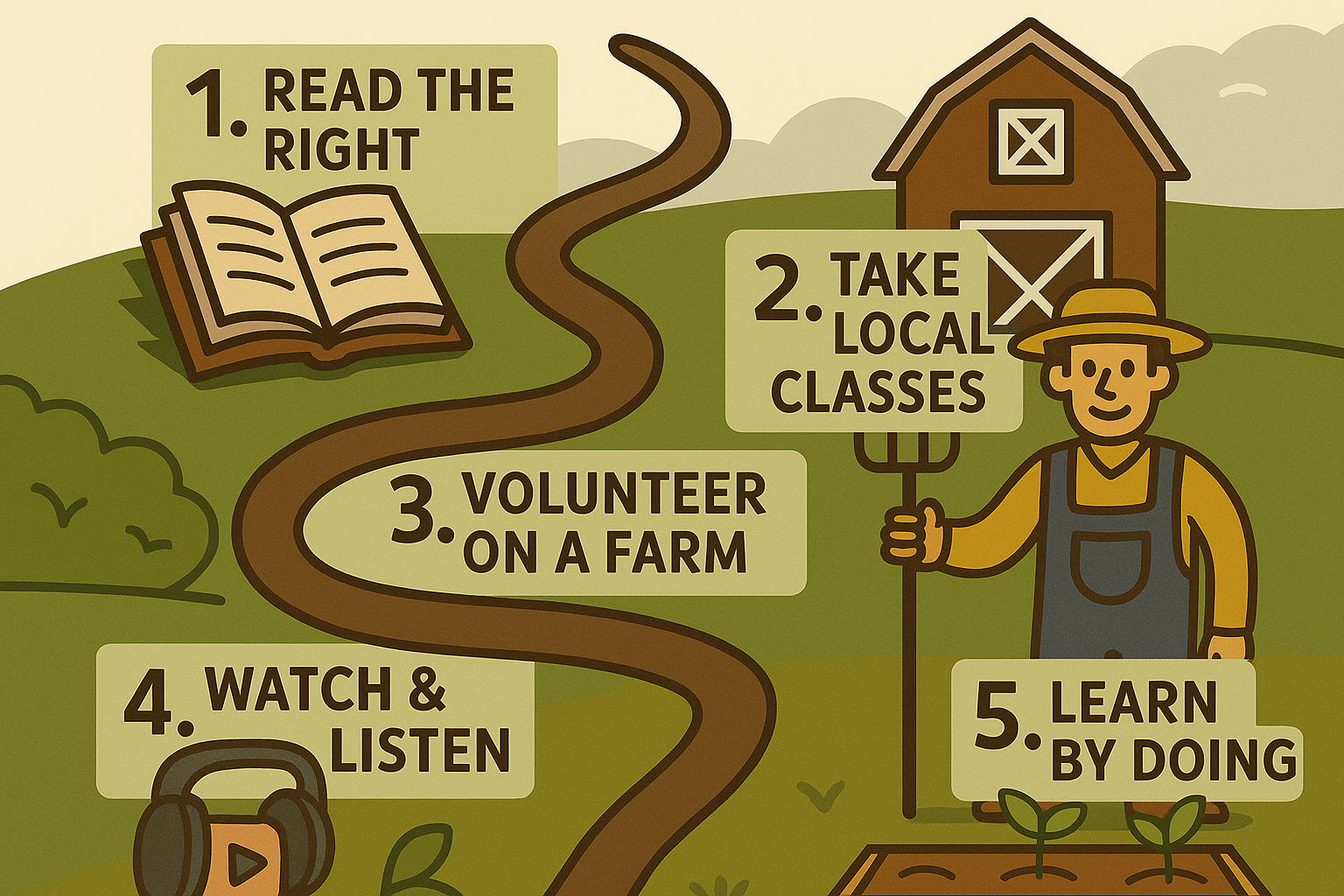 How to learn about farming by reading, viewing, volunteering, and doing How to learn about farming by reading, viewing, volunteering, and doingIf you’ve got a few acres or just a goal of owning land, you’ve probably asked yourself, “How can I actually learn about farming?” Whether you’re looking for more self-sufficiency, exploring side hustles, or just desiring a lifestyle shift, farming knowledge is a useful skill-set. And you don’t need to grow up on a farm to get it. I'm not a 'born farmer'; if I can learn these skills at the ripe old age of forty, it can be done by just about anyone. This page walks you through the why, what, and how of learning farming from scratch, tailored specifically for small property owners and homestead hopefuls. We'll start with 'WHY' before we get into the 'what' and 'how'. Your WHY will drive all the decisions you will make about learning to farm. WHY Do You Want To Learn About Farming?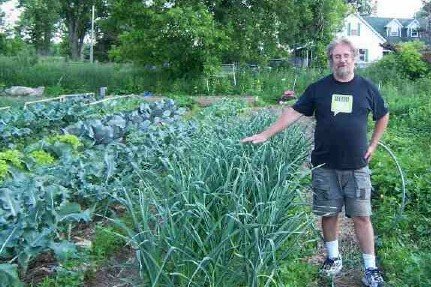 A man outstanding in his field A man outstanding in his fieldFarming is a huge field (it's my page, I'll pun if I want to). Trying to learn everything at once is a recipe for overwhelm and burnout. You need to narrow the scope of your education by focusing on your goals for your farm. Your goals decide your learning path. In other words, WHY learn about farming should come before HOW to learn about farming. Maybe your goal is increased food security and self-sufficiency. Learning to grow your own food puts some control back in your hands. We seem to be in times of inflation, food shortages, and global instability. Learning to grow a real food survival garden or raise a small flock of chickens for meat or eggs is a worthwhile goal. It's a good feeling to to know you can feed yourself and your family. Maybe you want to generate some income from your small property. Small scale farming is an excellent 'side hustle'. Whether you choose pasture-raised eggs or heirloom vegetables or small-batch honey or home-made jams and preserves, farming on a human scale can pay. If you want to make money farming a small property, learning is your first 'crop'. Start early and let it grow. Or your goal may be a combination of those two things. One rule we follow on New Terra Farm is Feed Yourself First. Learning how to fill your own larder can lead naturally to growing some extra for market. We learned the trade of growing for market by first growing for ourselves, then for a couple friends and neighbours. That's a low-risk way to learn to farm. And of course your learning path depends on the particular crops you want to raise. Let's look at some options. What You Need To Know Depends On What You Want To Grow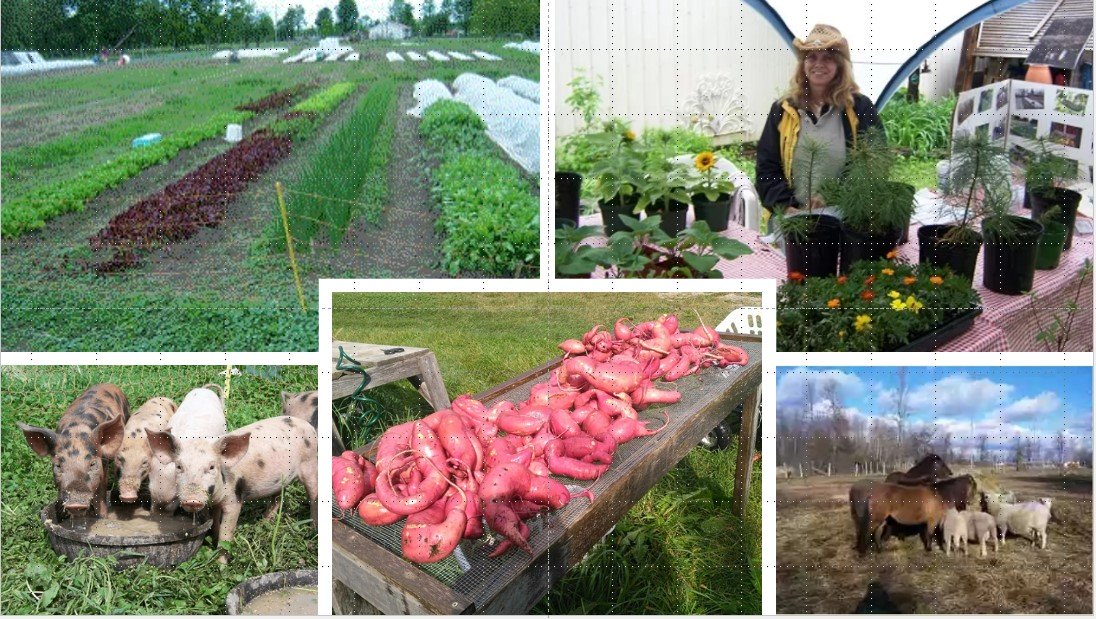 We grow a lot of stuff but we didn't learn how all at once We grow a lot of stuff but we didn't learn how all at onceYou can do anything but you can't do everything, at least not all at once. Let's look at a few starting points to acquire critical knowledge for your chosen endeavour. If you aspire to be a market gardener, start by learning soil health and crop basics:
If you are considering small livestock i.e. raising chickens, goats, or pigs for eggs, milk, or meat:
And for any small farm business to succeed, you need to know marketing and small farm business basics:
So, how does one acquire this critical knowledge? Free Guide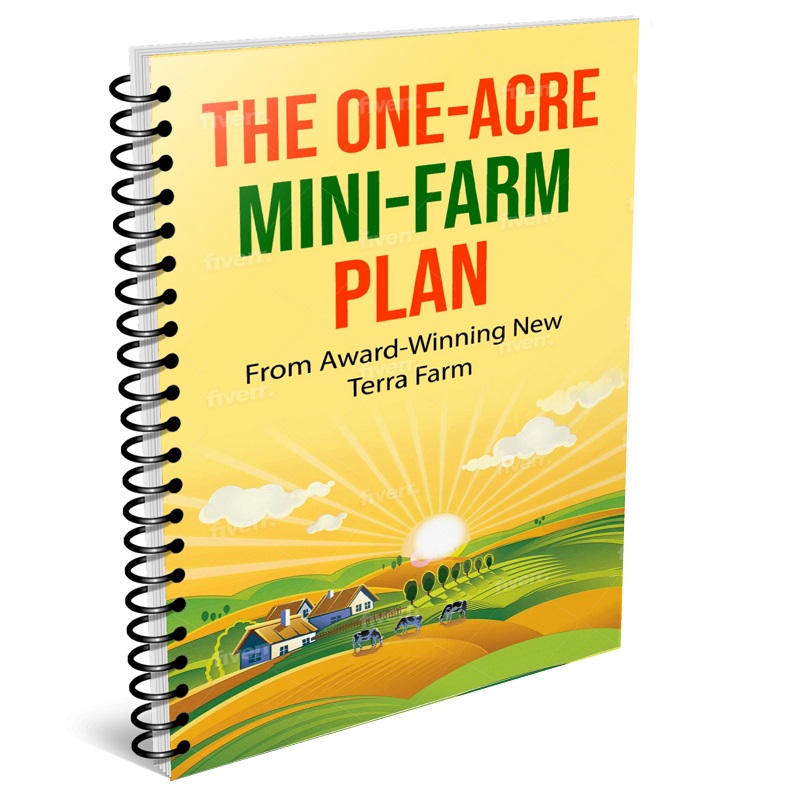 Get my FREE One-Acre Farm Plan and learn how to raise pigs, chickens and more, integrated with an organic market garden, to
make more money from your small property. Enter your best email and the free report will be sent to you right away. How to Learn About Farming Step-by-Step
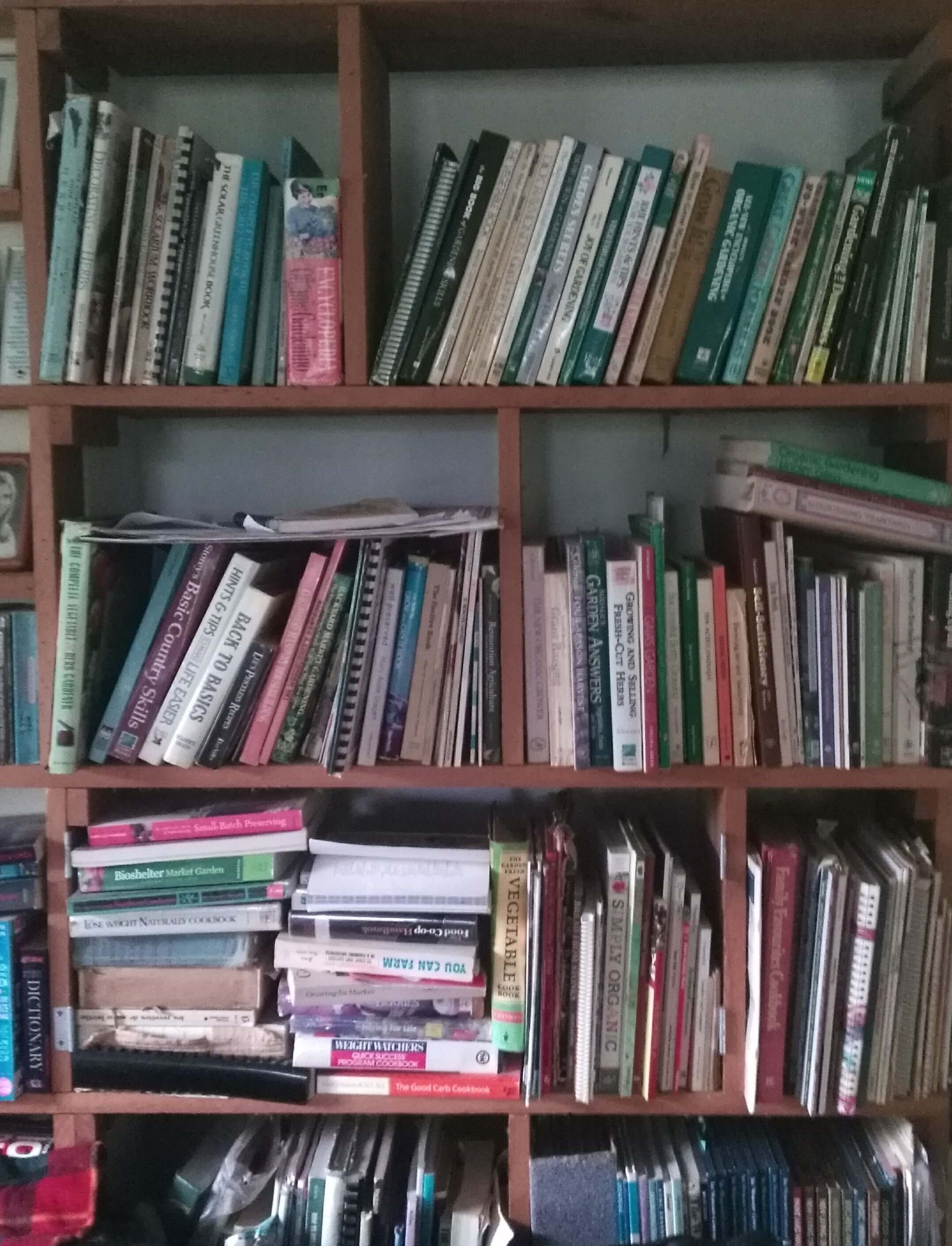 I read a LOT of farming books even before I had a farm I read a LOT of farming books even before I had a farmStart with reading the right books. My books are based on things I've actually done on my farm, and I like to read books by others that have done the same. Here's a few suggestions for how to learn about farming from the pros that have been there. Start reading hereA valuable guide for homesteaders and wanna-be small farmers: The Self-Sufficient Backyard The Self-Sufficient Backyard is an excellent resource for anyone who wants to learn how to farm—especially on a small scale or with limited resources. While not a precisely a book on small scale agriculture, it will teach you the essentials of producing your own food; fundamental for the small farmer. From building fertile soil and growing vegetables to managing small livestock and preserving the harvest, it offers foundational knowledge that every aspiring farmer needs. The book covers critical topics like food production, water management, energy systems, medicinal gardens, and a LOT of easy-to-implement DIY projects. Step-by-step instructions show you multiple ways to reduce dependency on external resources and create a sustainable, low-maintenance homestead. This is a must-have addition to your grower library. 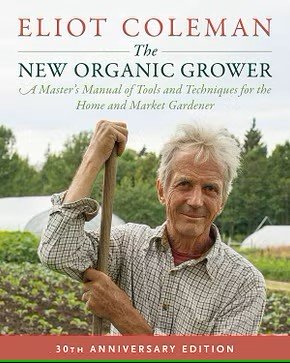 The New Organic Grower by Eliot Coleman Whether you're just starting out or already have some experience in gardening, this book offers clear, practical guidance rooted in decades of hands-on knowledge. The 30th-anniversary edition includes updated tools, techniques, and inspiring photography, along with the latest thinking in sustainable agriculture. It's especially useful for those working with a small acreage and looking to build a productive, profitable organic farm. I've had a copy of The New Organic Grower on my bookshelf for over 20 years, and it's still one of the best resources out there for learning how to farm organically on a small scale. 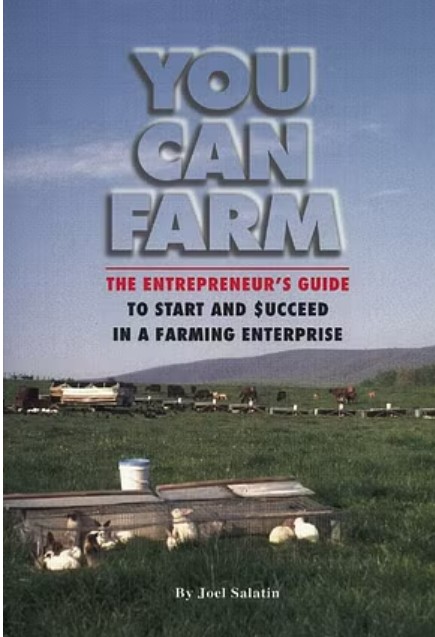
Joel Salatin has written more than a dozen books on building a successful small farm, and every one of them offers valuable insights (I’ve got them all n my farm library). But if you're new to his work or just starting to explore farming as a career, You Can Farm is the best place to begin. This book lays out a realistic, no-nonsense look at what it takes to start and sustain a small farm. It covers everything from imagining your future on the land to identifying ten of the most promising farm-based business models, and guides you through designing your farm and finding your market. If you're serious about turning your dream into a working farm, You Can Farm is one of the most practical and motivating resources you’ll find. 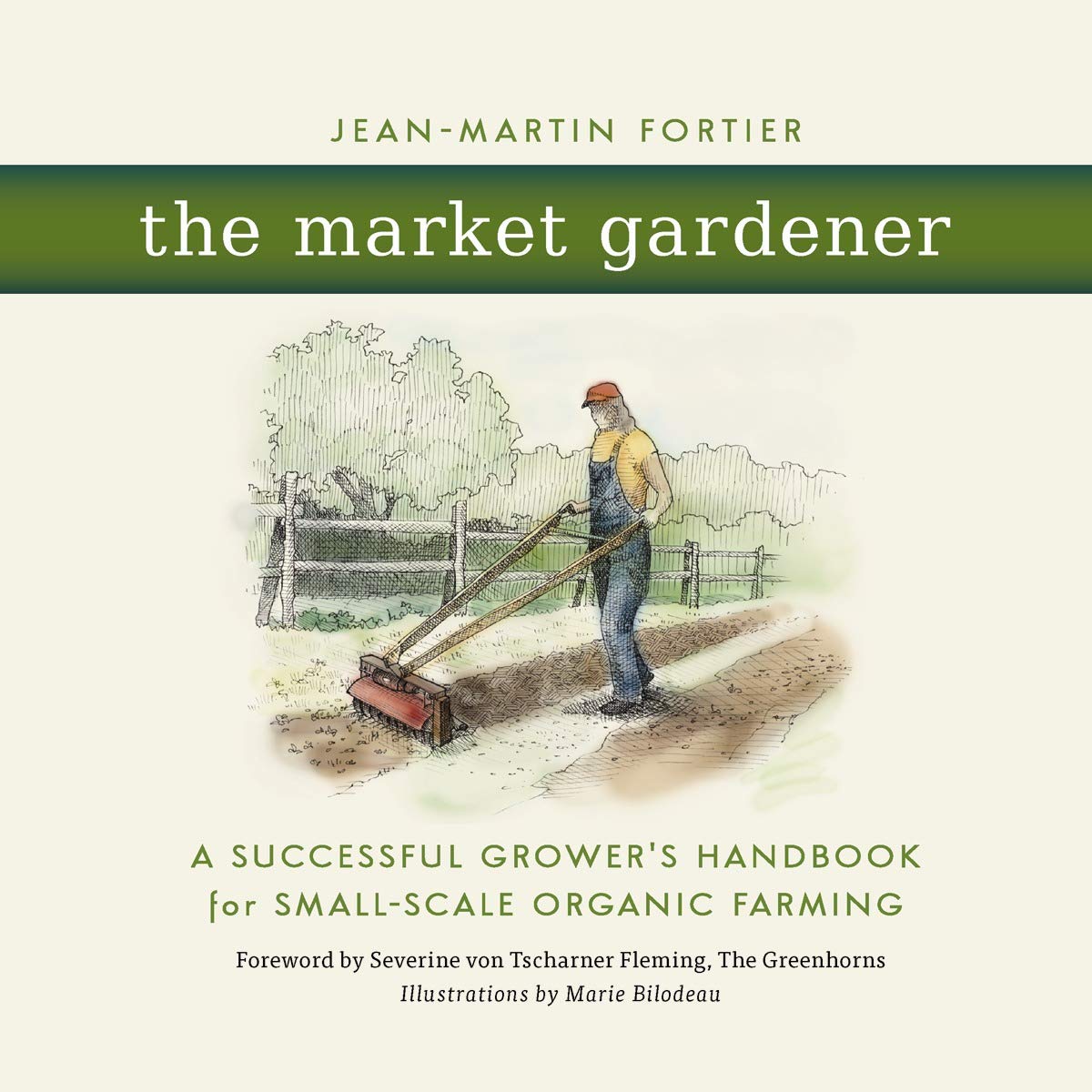 The Market Gardener by Jean-Martin Fortier You might call Jean-Martin Fortier's book about small-scale farming 'groundbreaking' For new growers, it sets out a clear, step-by-step approach to starting a successful farm. The book has inspired thousands of young people to see farming as a real and rewarding career path. It shows how rural life can be not only possible, but profitable. The book explains both practical tools and a successful model for the future of small-scale farming. These books will give you a practical perspective on the realities of gardening and farming for money. They should help you hone in on your first farm enterprise. With that goal in mind, the next step is seeking out classes and workshops to enhance your knowledge. How to Learn About Farming from Local Classes and Workshops
Good news for anyone on the path of learning how to farm; these days, there is a wealth of classes and workshops that can help you take the next step. From local extension programs to farm tours and sustainable agriculture courses, here are some of the best ways to gain practical knowledge and start growing with confidence. County Extension Programs County extension offices, often run in partnership with local universities, are one of the best resources for new farmers. These programs provide free or low-cost education, soil testing, and expert advice tailored to your region. Want to learn how to build healthy soil, manage pests naturally, or rotate crops for better yields? Extension agents can show you how. Many also host workshops, field days, and training sessions focused on everything from small-scale vegetable farming to raising backyard chickens. For beginner farmers, it’s an accessible and reliable place to start. Sustainable Agriculture Nonprofits Across North America, there are nonprofit organizations dedicated to teaching and promoting sustainable, regenerative farming practices. These groups often offer courses, apprenticeships, and mentorship programs focused on organic production, low-input growing systems, and local food marketing. Whether you want to master cover cropping, learn how to price your produce, or start a CSA, these nonprofits provide practical training rooted in real-world farm experience. They're especially helpful for those who value environmental stewardship and want to build a farm that’s both profitable and planet-friendly. Permaculture Design Courses Permaculture design courses offer a deep dive into designing productive, self-sustaining systems that work in harmony with nature. For aspiring farmers, these courses teach you how to observe your land, use natural patterns to guide your planning, and integrate crops, livestock, and infrastructure in a way that minimizes labor and maximizes resilience. Topics include soil building, water harvesting, perennial crops, and food forests—all of which can be applied to farms of any size. It’s a holistic approach to farming that helps you create a system that works smarter. Farm Tours or Homestead Days Many working farms and homesteads open their gates for public tours, workshops, or special events throughout the growing season. These are excellent opportunities to see what farming looks like in real life, beyond books or YouTube videos. You can walk the fields, ask questions, observe equipment in action, and get a feel for different approaches to growing food, raising animals, or preserving the harvest. Some farms even host "field-to-table" experiences, giving you firsthand insight into the full food production cycle. It's an inspiring, way to learn and network with others on the same path. The common thread among these options is accessibility. Whether you're learning about composting, soil biology, livestock care, or greenhouse growing, these resources offer affordable, hands-on learning. You don’t need to spend thousands on a college degree in agriculture—many of these classes are community-based, beginner-friendly, and taught by people who actually farm. If you're serious about learning how to farm, these practical experiences will help you build confidence, skills, and a clearer vision for your own land and goals. Next up, how to learn about farming by volunteering. How to Learn About Farming by VolunteeringEven a weekend spent working on a local farm can 'lock in' the knowledge you get from books and courses. I still lend a hand to my farming neighbours and I inevitably learn something new. There’s a big difference between reading about farming and doing it. A few hours helping out on a local farm gives you a chance to experience the pace and physicality of real-life food production. Cleaning a chicken coop isn’t glamorous, but it’s part of the daily rhythm of farm life. Doing it shows you what it really takes to care for animals; not just keeping them fed, but keeping them healthy and comfortable. You’ll learn about bedding types, odor control, and even how to spot signs of illness. It’s a great introduction to the kind of routine work that builds a strong foundation in animal husbandry. Weeding might sound simple, but when you’re standing in a 100-foot bed of carrots, you quickly learn what effective, efficient weeding really means. You’ll see how farmers manage weeds without harming crops, when to flame weed versus hand-weed, and why timing is everything. These hands-on lessons are essential for anyone planning to grow organically or manage a market garden. Spending time around livestock gives you a real sense of how animals act when they’re happy, hungry, stressed, or sick. You’ll learn to notice things like posture, movement, social behavior, and appetite; subtle cues that are essential to good animal care. Whether you’re planning to raise chickens, goats, pigs, or something else, these insights help you build confidence and competence before taking the plunge on your own animals. Check Facebook groups or websites like WWOOF for local opportunities If you want to learn by doing, there are more opportunities than you might think. Local Facebook groups for homesteaders, market gardeners, or organic growers often post calls for volunteers, farm tours, or weekend work days. Platforms like WWOOF (Worldwide Opportunities on Organic Farms) connect aspiring farmers with hosts who offer hands-on learning in exchange for help. These short-term experiences are low-cost, low-risk, and often incredibly rewarding. Next: How to learn about farming on-line. How to Learn About Farming from
(Curated)
Podcasts and YouTube Videos
Online content can be one of the most accessible and affordable ways to start learning about farming—especially if you're still in the dreaming or planning stage. But with so much out there, it's easy to get overwhelmed or sidetracked by trends and flashy content. The key is to choose your sources wisely. Curated, experience-based channels and podcasts can offer real insight, especially when paired with hands-on learning or your own garden experiments. YouTube Channels: These YouTube creators share the kind of detailed, boots-on-the-ground knowledge that’s especially helpful for beginners. Their videos let you see how farming works in real time, from planting schedules and infrastructure setup to family life on the land.
Podcasts Farming podcasts let you absorb valuable insights from successful growers and educators across the country.
Be systematic: pick one channel and follow them through a full season. Watch how they plan, plant, manage pests, harvest, and observe what worked and what didn't. This helps you understand the rhythm and flow of farming over time. Learn by Doing on Your Own Land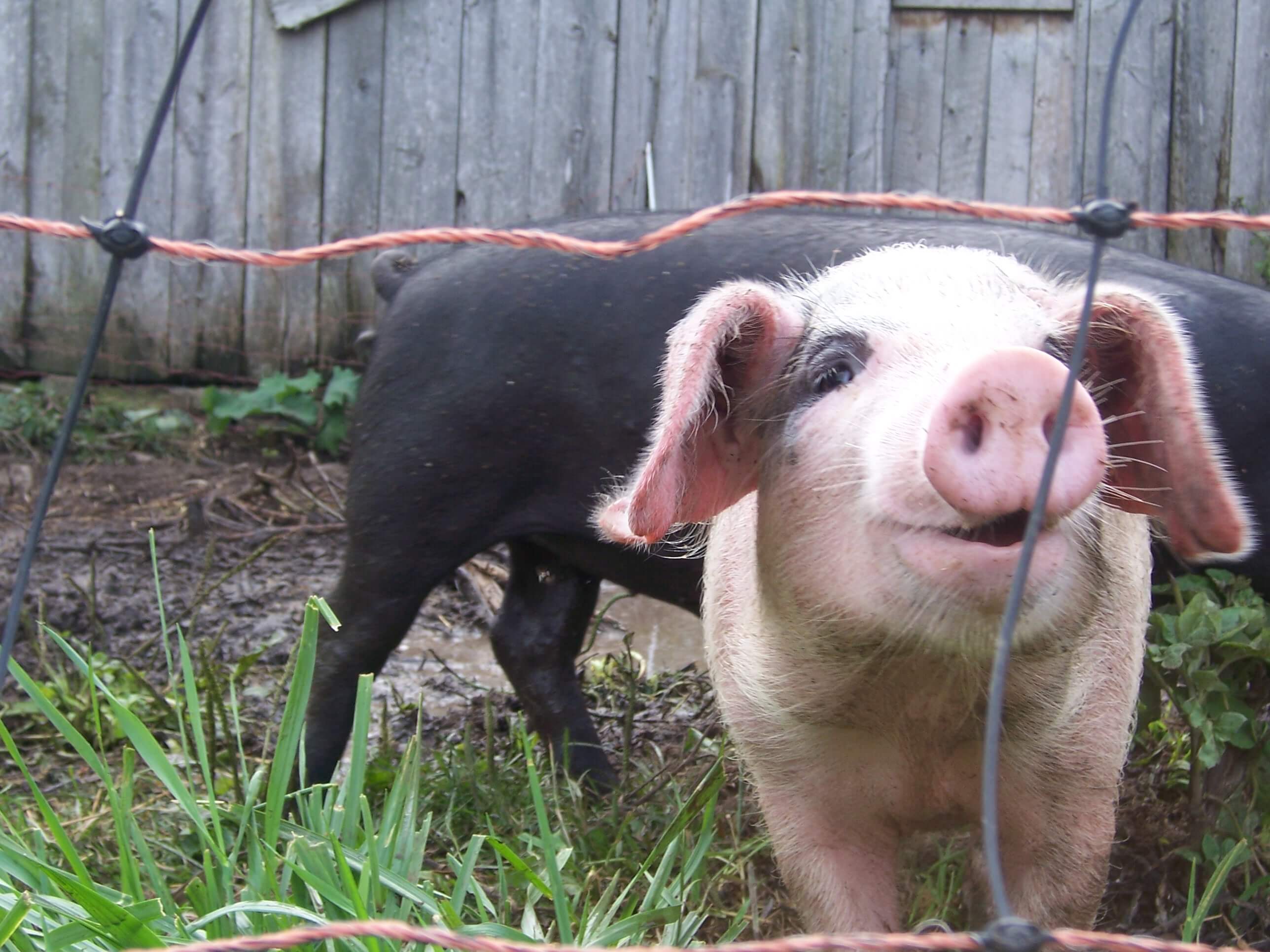 Pigs were top of my small livestock list, love me some Bootstrap Bacon! Pigs were top of my small livestock list, love me some Bootstrap Bacon!When we started New Terra Farm,. one of our principles was 'Feed Yourself First'. In other words, learn how to farm by focusing on growing our own food, before we expanded into commercial production. One of the most effective ways to learn how to farm is simply to start, right where you are. You don’t need acres or expensive equipment. What you do need is the willingness to try, observe, and adapt. Farming is a hands-on craft, and there's no substitute for real experience. Even a few square feet of soil and a couple of animals can teach you more than any book ever could. Starting small allows you to build skills without getting overwhelmed or making costly mistakes. Treat your small setup like a real farm. Track what you plant, when you harvest, how much your hens lay, how much your piggies eat to reach butcher weight. Write down what works and what doesn’t. These notes will become your personal farm manual. Over time, these small efforts will build real skills. This is how many farmers before you have learned the trade; by doing, failing, fixing, and doing again. An Indispensable Resource for the Small Property OwnerI didn't write this one, but it's an excellent resource for the homesteader or small property owner anyway! The Self-Sufficient Backyard has literally hundreds of plans and practical tools and techniques for the serious homesteader.Written by a couple who have actually done the work. From growing food, to medicinal herbs, solar electricity, root cellaring, growing small livestock, and selling select produce as a side hustle, plus many more money-saving and money-making ideas, this book is an encyclopedia of growing and building knowledge. A must-have in your homestead library. I only write about topics I have personal experience with. The authors of The Self-Sufficient Backyard have done the same. Highly recommended! Other Links of Interest for the New FarmerHere's my curated list of micro-farm equipment for the small grower Diversify, but do it smart. Read this before you start. Farm Side hustles that work in the real world You might also want to up your farming game with my Bootstrap Book series. Practical, actionable guidance to grow more, sell more, and make your farm more sustainable.
|
See Something You Like? Share!
Comment or Question About This Topic?
Got something to say or story to tell about this? Share it!
Recent Articles
-
1 Acre Farm Ideas: Profitable Micro-Niche Farming That Works
Feb 18, 26 08:56 AM
Discover proven 1 acre farm ideas that actually make money. Learn how to find micro-niches, set prices, and build a profitable small farm business fast. -
New Terra Farm market gardening book shows you success step-by-step
Feb 17, 26 05:10 AM
Start-up, market and manage a successful organic market garden with my Bootstrap Market Gardening Book -
Farm training for the new or wannabe farmer
Jan 02, 26 10:38 AM
Practical farm training from award-winning New Terra Farm
